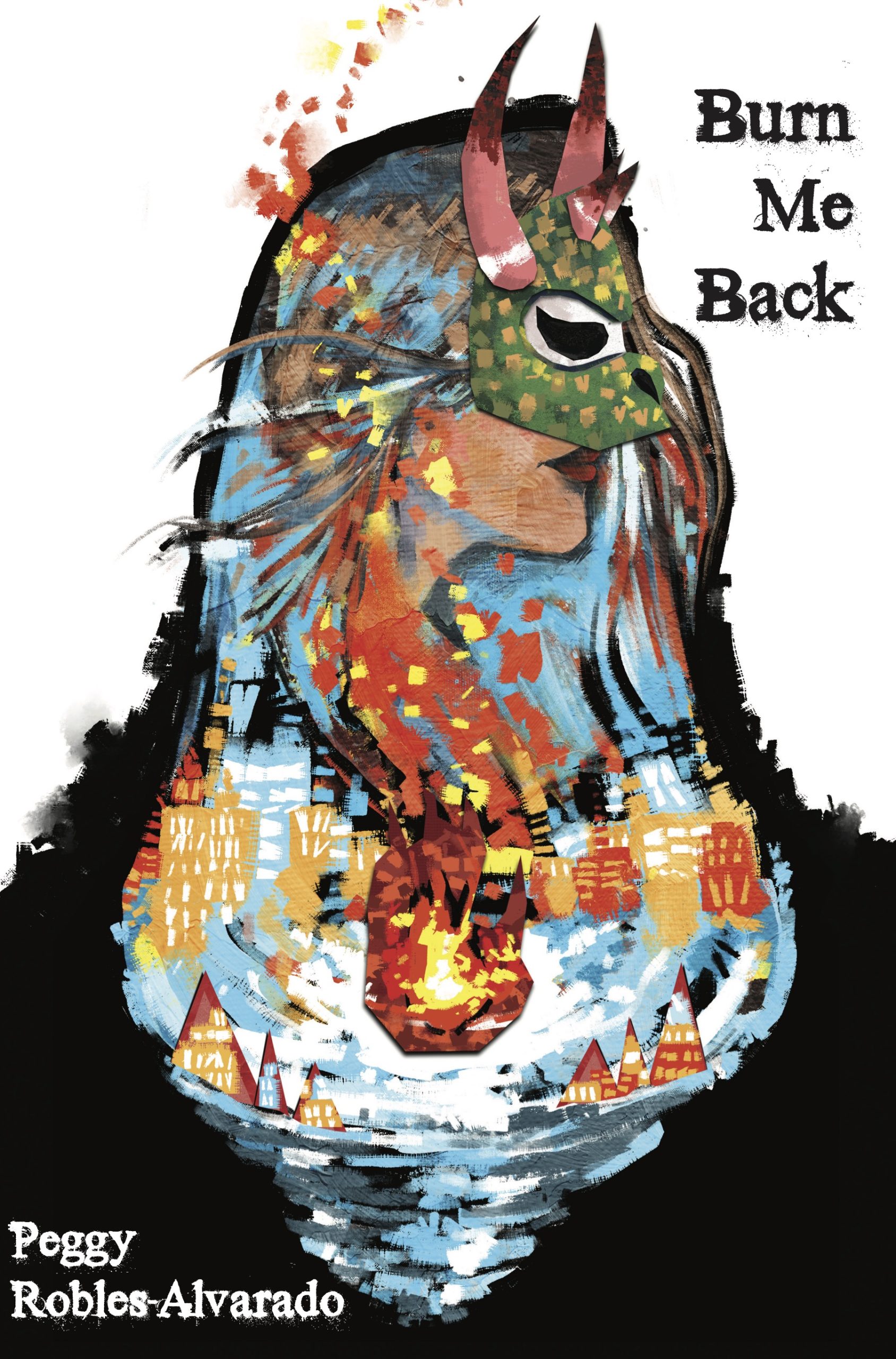
paper • 160 pages • 17.95
ISBN: 978-1-961897-66-3
eISBN: 978-1-961897-67-0
September 2025 • Poetry
“My Spanglish,” Peggy Robles-Alvarado declares, “drops the -s and makes it ma’ o meno’,” replaces accent marks with side-eye, “has a Tía sin papeles,” and recognizes that “there is no other way to say— / Cónchole papi, you look good!” Igniting across tongues, cultures, and countries, the incendiary poems in Burn Me Back harness the incantatory power of language through hybrid forms, preserving a beloved father’s memory, enshrining the legacy of the Latino immigrant community in Washington Heights and the Bronx, reimagining the world we share, and speaking toward a hopeful multiplicity of possible futures. At the cross section of Puerto Rican and Dominican diasporas, rooted in ancestral narratives and infused with generational dislocation, this speaker refuses to abandon what resists translation, makes the space she needs, and transforms objects as she names them: “My Spanglish knows a fire escape is also a terrace.” Yes, the language here is a feat of engineering — a design shaped by the conditions of emergency, an architecture of survival, deliverance to open air. Like isolating the notes in a thunderous chord, Robles-Alvarado dexterously teases out each word’s many meanings, listening for the individual strains that created her as she archives family lore and fleshes out her personal history, writing against patriarchy while codifying working-class wisdom. She reconstructs a whole genealogy in “What They Mean by Papers,” reciting a negative litany of “papeles.” “Not the Daily News or El Diario La Prensa, / or the kind my mother read to me on Sunday / mornings,” her “throat full of / pelitos de mango,” “Not the kind Tía Weltina used to roll her tobacco with,” “conjuring / Taíno spirits she exhaled … as she tried to memorize the national anthem,” but the kind “Uncle Rito forged” while he “learned to curl the R in his name / as if writing sacred geometry,” “the kind that convinced four of my aunts to marry older / naturalized men in exchange for an acre of my grandfather’s campo” — the kind that required the rest of their lives as payment, “their bodies, / all their milk and honey, all their amber and caña dulce / sacrificed to the lust of viejos verdes, old bastards / who soured early on too much tabaco y ron and wanted to plant / their moldy seeds in supple girls who had never seen snow.” Robles-Alvarado orchestrates the fullness of her song by refusing to leave anyone out, by making room for a term’s contradictory definitions and playing through discordant combinations until the dissonance resolves. What began as an elegy composed by a daughter lost in mourning becomes an expansive arrangement sounding rupture and repair. This music travels between loss and recovery, addiction and sobriety, the cooling embers of lost childhood and the heat of the present, this very moment in which you could reach out to the people around you and ask them to be here with you for every scalding second, the warmth of your skin against theirs posing a burning question — an invitation to burn you back.
Sábados De Gloria In Haiku
Awake before nine,
speakers singing merengue—
weekly ritual.
Prayers for our home
Mistolín, holy water
and Fabuloso.
Gloria mops the floor.
Her hips sway to el coro
de Fernandito.
Moving furniture
to get to all the corners,
she lights a cigar.
Clouds each room with smoke,
says Lord’s prayer between tracks.
Here, God dances too.
Washing away sin
by day, and drinking all night—
a game of seesaw.
Our home: a temple
for both heathen and holy
with beer on their breath.
Let us begin by declaring that Peggy Robles-Alvarado is a magic maker. Her poetry plows under your skin until you feel your soul brimming with epiphanies. In Burn Me Back, Robles-Alvarado invites us to party with the machinations of truth-telling, and no matter how much you try to avert its gaze, there is enough lyric, enough innovative turn of phrase, enough history, enough fire, enough celestial invocation, enough family lore to make you a believer in rebirth, in salvaging what is left in the aftermath of a lineage fractured by secrets. If you ever doubted poetry’s ability to make you whole, welcome to this sublime reckoning.
Peggy Robles-Alvarado’s Burn Me Back sings with the gale force of Oyá and Guabancex, its verbivocovisual spell encompassing fractured lyric narrative, performance score, experimental process writing, concrete poetry, and Afro-Latina testimonio. Come for the rhythmic dazzle, fierce wit, Spanglish glyphs, and mujerista erotics, and stay for the diasporic world-building, rooted in working class New York Puerto Rican and Dominican histories and all their hard-earned wisdom. This book is unflinching in its reckoning with cross-generational violence and trauma as they connect to patriarchy, colonialism, and displacement, yet it also claims the performalist power (translingual acrostics, yo!) to forge a somatic language as untranslatable and expansive as our bodyminds (“reteach my bones to speak survival”). Robles-Alvarado is an essential figure in Nueva York poetry and performance and Burn Me Back is her best work yet, a virtuosic primer on survival as a shared creative practice of ‘liberación and pleasure’ that demands new ways of reading and meaning